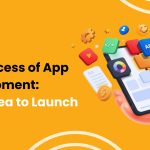How to Build a Mobile App for Your Company? 9 Hacks of 2024.
With global mobile phone users set to reach 7.49 billion worldwide in 2025, mobiles have become the first and foremost way to interact. China has the most mobile phone users, followed by India and the United States of America (USA).
For businesses, having a mobile application used to be a luxury. Now, it is something that cannot be done away with, as it has become the basic necessity for any business trying to make its mark in the market and hearts of its target audience.
Thus, choosing the best mobile app developer is vital for growth and ROI goals. But it is also a hassle as well. Why, you may wonder?
Mobile apps have,
- Infinite (7 million) developers,
- Various development platforms,
- Varied features & functionalities, and
- Many types.
Thus, it is better to understand the intricacies of difficult apps and their development process to ensure great results later on!
A few facts pertaining to mobile apps
- The mobile app market’s revenue share will be USD 673.79 billion by 2027
- In-app purchases’ revenues are raking in a huge CAGR (compound annual growth rate) of 24% as they grew from USD 171.82 billion (2023) to USD 213.36 billion (expected in 2024)
- By 2024, there will be 96 million apps on the Apple Store and 2.87 million apps on Play Store.
- The average time spent by US adults on mobile phones will be 4 hours, 39 minutes (2024)
- The mobile retail-conversion rate (2024) will be 2.9% (web conversion rate: 4.8%)

Mobile apps or applications are those specifically developed and designed programs and/or software that run on smaller electronic gadgets such as phone. Due to its popularity, the word ‘app’ was voted as the Word of the Year in 2010 by the American Dialect Society.
Now let us understand the various types of mobile apps currently available in the market.
Types of Mobile Apps
There are three types of mobile apps. Let us understand them in detail.
Native Mobile Apps (Android and iOS)
Pros:
- Separate app (in codes) for Android and iOS,
- Native Apps best UI/UX experience.
Cons:
- Higher development costs,
- Difficulty in finding dedicated resources, and
- More man-hours are required to develop an app
- Hence increased cost.
Hybrid Mobile Apps (Android and iOS)
Pros:
- Hybrid apps, also known as Cross Platform Apps work on multiple platforms like iOS, Android and more with a single codebase.
- These apps are built using the same technology stack like Xamarin, Flutter, React Native, and more for both platforms.
- Less Expensive and Quicker development compared to separate native apps.
Cons:
- Users sometimes compromise on the smooth UI/UX as they can’t provide a sheer “native” experience.
- Hybrid Mobile apps require more processing memory which can lead to performance degradation.
Mobile-responsive Web Apps
Pros:
- Consistent UX
- Easier upkeep
- Improved SEO practices
Cons:
- Slow loading,
- Complex coding,
- Design limitations
Examples of,
-
Native apps are community apps like Mighty Networks, learning apps for languages like Duolingo, and more.
-
Hybrid apps are note-taking apps like Evernote, business communication apps like Microsoft Teams, and more.
-
Mobile-responsive web apps are file-sharing apps like Dropbox, resource-sharing apps like GitHub, and more.
With the above information, you will get a rough idea of the type of mobile app that suits you the best!
How much does it cost to build a mobile app?
From a developer standpoint, mobile apps are of three types, depending on their complexity:
-
Simple app: time taken to build lies between 1-3 months. Examples include communication apps like Zoom, Skype, Taxi Apps and more.
-
Standard app: the time taken to build lies between 4 to 9 months. Examples include e-commerce apps like Amazon and Myntra, educational apps like Byju’s, and more.
-
Complex app: This includes multiple features and functionality and time taken to build these apps are generally more than ten months. Examples include social media apps like Instagram, WhatsApp, Bidding apps, Gaming apps, IOT apps and more.
The pricing per hour for a US- or UK-based developer ranges between USD 40 to 100, while a developer from India charges only USD 15 to 40.
Thus, it is best suited to look for a developer partner from India and use the money saved in other avenues such as digital marketing, website development, and more.
Building the best mobile app in India
It might feel difficult at first to explore and finalize a mobile app’s development. Worry not; we have your back. The below-mentioned nine pointers will help you make a checklist that will replicate the software development life cycle (SDLC) of the app.
1) Identifying the app’s requirements:
Before going into the market looking for developer options, you need to understand what you want. Chart down platform, usage, storage location, features, functionalities, target audience, and purpose. You also need to look at market-perspective metrics like market share (ROI), potential, and market fit. It would be best if you did a TAM (total addressable market)/ SAM (serviceable available market)/ SOM (serviceable obtainable market) analysis.

Try to look for developer companies that specialize in your domain. Also, find out if:
-
Developers do both Android and iOS apps.
-
Project management is provided.
-
Experience in Niche apps.
-
Expertise in AR (augmented reality) and VR (virtual reality), gaming, AI, and other latest tech trends.
-
Developer’s location and team size.
This will provide you with enough data about the developer options that you have.
3) Portfolio checkup:
Check the portfolios of the top contenders and find out reviews about the quality (of their work), user experience (UX), app design, and overall functionalities provided with the apps developed by them.
4) Evaluating the app design process:
For great UX and a successful app, it must have a well-thought-out design. The development team (DT) must follow a user-centric process, focusing on UX, and ensure that the app gets developed accordingly. First impressions matter in terms of UX and user interface (UI).
5) Evaluating expertise, experience, and supported technologies:
The latest app development technology and framework that have cross-platform functionality should be used. DT should have experience in developing apps and websites in your domain so that you have references to compare them with.
6) Budgetary allocations:
Budget allocations set boundaries to mark the playing field that the app development process will have. Try to strike a balance between the affordability and quality of the app to hit the right spot!
7) Development Process:
Once you start development, it is best to let it flow! Creativity requires an untethered flow of energy. With every milestone accomplished, you will see your imagination taking shape in the form of wireframes, APIs, and more. Good communication and appropriate feedback are important, as they help in sculpting and polishing the app. Testing and quality assurance are the next steps in the development process. As the development process ends, you will have a beautiful mobile app that is ready to spread your brand’s message across the world and cater your services to all its users.
8) Post-launch support and maintenance:
Mobile apps need to be updated regularly. Thus, it is advisable to have a post-launch support and maintenance plan ready. Also, certain features, such as web and push notification servers, databases, security patches, and more, need to be sent to the app from the backend on a periodic and/or as-required basis. The ideal support window should lie between 1 months to 1 year.
9) Customer reviews:
The actual or organic customer review helps in shaping the app further because no tester can use the app like a keen user. Many users, in the hopes of improving their in-app experience, guide the development team in improving it for all. So, upgrading the app should be cherished and valued. Because the end result would be an app that is a delightful experience in small bundles of color and joy.
Your choices and decisiveness will be reflected in either praise or negative feedback, so choose wisely! Give your brand the freedom to fly with the wings that will be developed for it in the form of its apps and website.
We, Wildnet Technologies are a mobile app development company in India. We have been in IT development, digital marketing, and other services for 17+ years. We have had the pleasure of completing 200+ projects for 250+ clients.
We have dedicated 250+ resources to various technologies like Java, DevOps, ASP.NET, Python, React Native, and more. Plus, our resources work in time zones suitable for our clients, providing dedicated support, ensuring quality control, and preventing any data loss or breach of non-disclosure agreements (NDAs).
A few of our accolades over the years,
Reach out to us at info@wildnettechnologies.com and get the mobile app of your dreams!
Need help ! Contact Us






